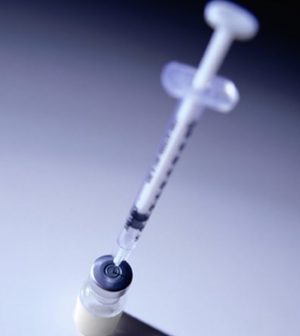- Recognizing the Signs of Hypothyroidism
- 10 Strategies to Overcome Insomnia
- Could Artificial Sweeteners Be Aging the Brain Faster?
- Techniques for Soothing Your Nervous System
- Does the Water in Your House Smell Funny? Here’s Why
- Can a Daily Dose of Apple Cider Vinegar Actually Aid Weight Loss?
- 6 Health Beverages That Can Actually Spike Your Blood Sugar
- Treatment Options for Social Anxiety Disorder
- Understanding the Connection Between Anxiety and Depression
- How Daily Prunes Can Influence Cholesterol and Inflammation
NIH Starts Trial Looking at Rare Allergic Reactions to COVID Vaccines

A new clinical trial will investigate whether people who are highly allergic or have what’s known as a mast cell disorder are at higher risk for a sudden allergic reaction to the Moderna or Pfizer COVID-19 vaccines.
“The public understandably has been concerned about reports of rare, severe allergic reactions to the Moderna and Pfizer-BioNTech COVID-19 vaccines,” said Dr. Anthony Fauci, director of the U.S. National Institute of Allergy and Infectious Diseases (NIAID).
“The information gathered during this trial will help doctors advise people who are highly allergic or have a mast cell disorder about the risks and benefits of receiving these two vaccines. However, for most people, the benefits of COVID-19 vaccination far outweigh the risks,” Fauci said in a NIAID news release.
A systemic allergic reaction to a vaccine occurs in one or more parts of the body away from the injection site.
A mast cell disorder is caused by a type of white blood cell that is abnormal, overly active, or both. It puts a person at risk for life-threatening responses that look like allergic reactions.
Researchers will also look at the biological mechanism causing the reactions and whether there is a way to predict who is at most risk.
The Moderna and Pfizer COVID-19 vaccines have been given to millions of Americans. Most of the rare, severe reactions have happened to people with a history of allergies. A number of them had previously had a life-threatening allergic reaction called anaphylaxis, the researchers noted.
The new study will enroll 3,400 people between 18 and 69 years of age. Up to 35 allergy-research centers across the United States will take part, according to NIAID.
By design, about 60% of study participants must have a history of severe allergic reactions or have been diagnosed with a mast cell disorder. The rest will not.
Participants will be randomly assigned to receive either the Pfizer or Moderna shot, or a placebo followed by either vaccine.
About two-thirds of participants will be women, because severe allergic reactions to vaccines — and particularly to the Moderna and Pfizer COVID-19 vaccines — have happened in women, the researchers said.
The investigators will look at how many participants in each group have a systemic allergic reaction within 90 minutes after injection.
Results are expected late this summer.
More information
To learn more about COVID-19 vaccine safety, visit the U.S. Centers for Disease Control and Prevention.
SOURCE: U.S. National Institute of Allergy and Infectious Diseases, news release, April 7, 2021
Source: HealthDay
Copyright © 2026 HealthDay. All rights reserved.










